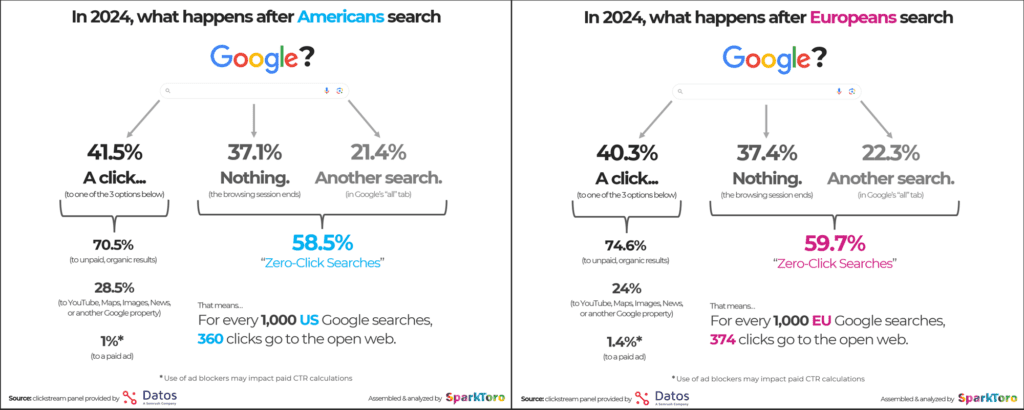We have some critical insights from a recent study on Google searches in 2024. The data reveals that nearly 60% of Google searches result in zero clicks. This finding has significant implications for website traffic and search engine optimization (SEO) strategies. Here’s a detailed look at the study’s findings and what they mean for you.
Table of Contents
Zero-Click Searches: A Growing Trend
A majority of Google searches – 58.5% in the U.S. and 59.7% in the EU – result in zero clicks. This means users end their session or enter a new query without clicking on any results. The data comes from a new study by Rand Fishkin, SparkToro’s CEO and co-founder, based on clickstream data from Datos, owned by Semrush.
We have some critical insights from a recent study on Google searches in 2024. The data reveals that nearly 60% of Google searches result in zero clicks. This finding has significant implications for website traffic and search engine optimization (SEO) strategies. Here’s a detailed look at the study’s findings and what they mean for you.
Zero-Click Searches: A Growing Trend
A majority of Google searches – 58.5% in the U.S. and 59.7% in the EU – result in zero clicks. This means users end their session or enter a new query without clicking on any results. The data comes from a new study by Rand Fishkin, SparkToro’s CEO and co-founder, based on clickstream data from Datos, owned by Semrush.

Why We Care
Clicks impact Google Search rankings. This was confirmed during the Google antitrust trial and is supported by the findings of the Google Search leak. It’s important to note that not all users want to click on a link to get an answer. Many zero-click searchers were never your target audience in the first place, according to technical SEO consultant Pedro Dias on X.
Key Findings from the Study
Clicks to Google Properties:
Nearly 30% of all clicks in the U.S. go to Google-owned properties like YouTube, Google Images, and Google Maps.
· If users click on Google’s YouTube, they see a video created by a business, brand, or creator.
· For searches with local intent, users might get directions to a business without visiting its website.
· Google keeps users within its ecosystem, which might not be concerning if you’re optimizing for more than just Classic Search. It becomes an issue when Google expands into new verticals, leaving websites to compete for organic search traffic.
Traffic to Websites
For every 1,000 Google searches, 360 clicks in the U.S. go to the open web; in the EU, that number is 374.
· With an estimated 8.5 billion Google searches per day, this means over 3 billion clicks per day go to the open web in the U.S. – more than any other search engine gets in a single day.
AI Overviews
Desktop searches increased slightly, while mobile searches fell significantly between May and the previous four months.
· Google launched AI Overviews in May, which initially gave some dangerous and incorrect answers. This led to a pullback, and Google promised to improve the quality of AI Overviews.
· Despite the issues, Google claims AI Overviews have increased search usage, though no specific data was provided.
About the Data
The data was collected by Datos’ US & EU panel between September 2022 and May 2024, representing a diverse and statistically significant sample of users. While the data has limitations, it helps us understand the evolving behavior of searchers as Google shifts more towards becoming an answer engine rather than a search engine.
Conclusion
Understanding these trends can help you adapt your SEO strategies to Google’s changing search landscape. If you have any questions or need further insights on optimizing your online presence, feel free to contact us.
Reference – https://searchengineland.com/google-search-zero-click-study-2024-443869

Marcus D began his digital marketing career in 2009, specializing in SEO and online visibility. He has helped over 3,000 websites boost traffic and rankings through SEO, web design, content, and PPC strategies. At The Ocean Marketing, he continues to use his expertise to drive measurable growth for businesses.

